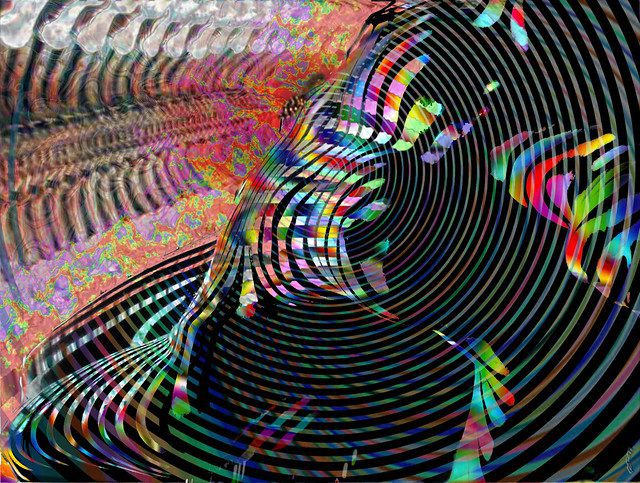
I believe these were originally notes jumbled together from various sources, so there is a lot of repetition. But that’s a good teaching tool, so I will leave it as it is.
*****
The Incarnation is the Great Exception to the timelessness and immateriality of the Triune God, since in it God enters human time and takes on human flesh. It’s in time and isn’t eternal. God can interact with the temporal order without being subject to it. But God the Son voluntarily “lowered himself” as it teaches in Philippians 2:5-11 (the kenosis).
Recently, I was disputing with someone who seemed to think that God was actually in time. But how could He be in time and create the universe? What would be the reference point with no matter to measure it? I think it is logically impossible, yet he believes this.
The Incarnation and Hypostatic Union are, on the other hand, in time. They had a beginning point, which was the conception of Jesus. Therefore, the glorification of Jesus’ resurrected Body is also a temporal event (which is, I think, a big component of the significance of the Ascension).
When we say “God never changes” we are talking about the Father, the Holy Spirit, and the Logos: all eternal and immaterial Persons of the Triune Godhead. Jesus is eternal, but He was not eternally the incarnate Messiah, with a body. That began when He was conceived in the Virgin Mary.
God the Father experiences all events as “now” but it doesn’t follow that Jesus was always in heaven with a glorified body. As far as I understand it (and I’m always perfectly willing to be corrected by Church teaching), that’s not true.
On the other hand, there is mystery even in the Incarnation because of the timeless aspect of the Cross. I wrote in my book, A Biblical Defense of Catholicism (p. 99):
Some verses in Revelation state that the “prayers of the saints” are being offered at the altar in the form of incense (8:3-4; cf. 5:8-9). But the climactic scene of this entire glorious portrayal of heaven occurs in Revelation 5:1-7. Verse 6 describes “a Lamb standing as though it had been slain.” Since the Lamb (Jesus, of course) is revealed as sitting in the midst of God’s throne (5:6, 7:17, 22:1,3; cf. Matthew 19:28, 25:31, Hebrews 1:8), which is in front of the golden altar (8:3), then it appears that the presentation of Christ to the Father as a Sacrifice is an ongoing (from God’s perspective, timeless) occurrence, precisely as in Catholic teaching. Thus the Mass is no more than what occurs in heaven, according to the clear revealed word of Scripture. When Hebrews speaks of a sacrifice made once (7:27), this is from a purely human, historical perspective (which Catholicism acknowledges in holding that the Mass is a “re-presentation” of the one Sacrifice at Calvary). However, there is a transcendent aspect of the Sacrifice as well.
A Christian, Catholic, biblical, theological mystery is not something we cannot comprehend at all; it is, rather, something that we can understand to a degree, but not totally. There are things about it we can indeed perfectly comprehend, within our inherent creaturely limitations and vantage point. We can grasp it to a degree by analogy, or parable, or approximation to something we do know. So it is false to believe that we can know nothing at all about such mysteries or that they are somehow in direct opposition to logical, rational thought. We can say a number of “correct” things about a Christian mystery, but in the end our knowledge is incomplete because we are finite creatures.
Even our esteemed Eastern Orthodox friends, who greatly emphasize the incomprehensibility of God (and often — wrongly — accuse Catholics of being “hyper-rational”), nevertheless engage in much sophisticated theology proper (of God). They accept dogmas just as we do. They have developed doctrines as we have, through rational reflection over centuries. They even develop their own distinctive doctrines of the last 1000 years, though many try to deny that they do this.
One example is the theology of St. Gregory Palamas concerning hesychasm, that I have written about. Many of the greatest theologians in the patristic period were from the East. But they recognize the ultimate mystery, and so do we Catholics.
We can make correct statements insofar as we can comprehend it a mystery, with our human limitations. For example, the Incarnation was an event in time, but the effect is timeless. We don’t have to conflate the two: deny that it was in time because it had a connection with the timelessness of the Father (and the Son, the Logos). Jesus was not eternally in heaven with a glorified body, because there was a time when He had no body at all. When He helped God the Father create the universe (in the past for us) He was a spirit. “Before Abraham was, I am” (John 8:58). We’re not forced to think illogically. We only have to recognize the limits of our rational understanding and to realize when simple faith necessarily kicks in.
Again, I reiterate that we can understand these things to an extent. We don’t have to regard them as literal gibberish utterly incomprehensible to us, as if they were some complicated scientific or mathematical formula or Sanskrit. Jesus was conceived in the Virgin Mary. He “became man.” That was an event in time. Prior to that, God did not have a physical body (in fact it was heresy to believe so: as Jehovah’s Witnesses and Mormons and others believe about the Father).
God can enter time because He is outside of time. He created time. He can interact with that which He created, by the nature of the case. It’s not contradictory. There is nothing illogical or impossible about it. God can enter time if He so chooses, just as He became a man. We can understand it to a large degree.
I’m very concerned that no impression is given that Catholic faith is irrational. It is not. Catholics believe (above all, St. Thomas Aquinas, who has often been proclaimed the preeminent Catholic theologian) that faith and reason exist in harmony, not conflict. The presence of mystery and things difficult to fully comprehend does not change this.
It’s like saying: “I can’t fully comprehend the theory of relativity; therefore it is irrational and contradictory.” That doesn’t follow. All this tells anyone is that I am limited in understanding that particular thing: not the logical or illogical status of the thing itself. Logic is something objective, outside of us.
What one does is take baby steps in trying to understand. So. for example, we could note the Doppler effect: where a car horn of a car passing by changes pitch. We heard a different pitch than the person in the car heard. The sound was relative to the person: yet this doesn’t entail a “contradiction.” This helps the layman start to understand how things can be relative to the observer, and that is one of the beginning premises of Einstein’s theory of relativity, that has been more or less proven by various scientific means in the last 100 years or so. Logic, however (at least classical logic) is not relative.
A true “logical impossibility” is a statement like the following ones:
1) God exists and doesn’t exist.
2) God created the earth and the moon to always be in the same place at the same time.
3) A square is a circle.
4) Dave Armstrong was born on July 30, 1958 and also on June 30, 1968.
5) The Detroit Lions won the Super Bowl (just a joke, folks!!!)
Christian mysteries are not examples of self-defeating “logical impossibilities” like these at all. To describe them as such only breeds confusion and creates the false impression that Christian and Catholic faith is an illogical or unreasonable thing, which it is not at all (and which idea many people use as an excuse to not accept Christianity and be a disciple). Christianity is far more logical and reasonable than any alternative atheist worldview, and Catholicism is (as you would fully expect me as a Catholic apologist to say!) the most reasonable and internally coherent Christian worldview.
We must not confuse the difficult to understand or the paradoxical, with the logically impossible. They are vastly different concepts. Hence, I have given examples of true logical impossibilities and showed how different they are from the theological notions under present consideration.
In true eternity (God’s perspective) there is no “before” and “after”. It’s de fide doctrine that God the Father is outside of time (as is the Holy Spirit and The Son — Logos). The relationship of the Incarnation to earthly time and eternity is where some paradox and mystery come in.
The question is what it means to be “timebound” at all in the Incarnation. This was an event in time (at least from our human perspective). It’s a paradox because we have a timeless God, yet He entered into time in the Incarnation. And then the Son ascended and entered into timelessness again. The difficulty is the exact way we describe these very difficult to comprehend things. If we are not careful, we can sometimes express things that are untrue. There are two different perspectives from which to analyze it: from the Father’s “eternal now” standpoint and the timebound nature of the Incarnation and the Ascension and Glorification of Jesus in heaven as an event (at least initially) in earthly time.
Jesus’ glorified body was not eternal. He didn’t have a body till the Incarnation. He didn’t have a glorified physical body until the Ascension. This was an event in earthly time. Jesus’ physical body is like a ray in geometry: eternal in one direction, but with a starting point. It is only (if we can speak this way) “relatively” eternal; not absolutely eternal (like God’s existence and attributes). Our eternity is relative to and lesser than God’s eternity, because we had a beginning and God did not. There is even a term for our “eternity”: it’s called “aeviternity”.
In other words, though God experiences and knows all things outside of time, as “now”, it doesn’t follow that the things themselves are outside of time. God would, for example, “see” me typing these very words. To him it is “now”; it is present for Him before it happens, as far as I myself experience it. But the fact that He experiences it as “now” doesn’t mean that it itself is a timeless event. It did happen in earthly time, and there was a time before which it occurred (right now it is 1:52 PM EST, etc.).
God experiences all things outside of time, “now”; but they are not themselves timeless, just as in the case of God “seeing” me writing these words. I wrote them in time, but for God it was not in time. But God, knowing all things, knows that it is indeed (as far as its own essence and nature) in time, in terms of earthly temporality. It was not an eternal act, and not of eternal duration. God knows what I will be doing at 6:23 today. For Him it already is; for me it is in the future and not yet known with certainty.
Likewise with the Incarnation. To God the Father it is timeless, but it is not so in and of itself. It is in time and had a starting point, just as we all did in being conceived (biologically). Because God is outside of time, He isn’t subject to the limitations of things that are in time (including us). We can dimly grasp this. C. S. Lewis described it as God being like an author of a book. He can lay down the book and then come back to it, and when he does so, the “world” of the book is always “present” to him. So in a sense the author enters into the different realm of the fictional world that he creates. But he transcends it. The fictional world has its own time, and the author’s time is different from it and goes beyond it. The author is outside of the time that he creates in his book.
Because things are difficult to understand, we mustn’t jump to the conclusion that they are illogical or incomprehensible, and that we can say nothing correct about them. This is untrue. If we can say nothing about mysteries at all, then we can have no dogma, and the Catholic faith would be reduced to a formless chaos. It would be completely, literally irrational, which means that it would be literally nonsense. And that is false. The Catholic faith is entirely reasonable. Mysteries go beyond reason, but do not contradict reason. If they did do that, I couldn’t rationally write about this issue right now. It would all be gibberish, because we could say nothing logical or reasonable about any mystery of the faith.
To believe otherwise would be radically contrary to the faith as it has been revealed to us, and explained by our greatest theologians and philosophers, like (above all) St. Thomas Aquinas, whose life work was to synthesize faith and reason, using Aristotle as a methodological model.
How could we have dogma at all if we thought faith and theological mystery was ultimately unreasonable and illogical? How could the Church have, through the centuries, thought about and developed dogma and described it in rational terms for human minds to comprehend? This would reduce all theology to nonsense (again, in a quite literal way: things that make no sense because they are supposedly completely incomprehensible).
Faith transcends reason but never contradicts it. The Holy Trinity is not “illogical” (it only is if one presupposes that every Being necessarily must have one Person only). Eternity is not irrational or illogical or unreasonable. There is nothing illogical about it. God had no beginning and has no end. He is immutable. How is that illogical? It’s tough to fully grasp, but we can go some distance. We can conceptualize a thing that always existed. We can imagine, for example, the universe itself as simply always having been there (even though now we’re pretty sure it had a beginning).
We consign faith to the realm of irrationality if we think like this, and that is a fatal move. If Catholicism is not rational, and indeed more rational than any other worldview, then we have no reason to follow it. Why would any Catholic want to think that? It would be futile to even try to explain the faith by reason and recourse to revelation, which is reasonable.
***
(originally 5-22-08)
Photo credit: new 1lluminati (11-14-12): Psychedelic Trip: To Infinity and Beyond: This Is the Afterlife [Flickr / CC BY 2.0 license]
***












